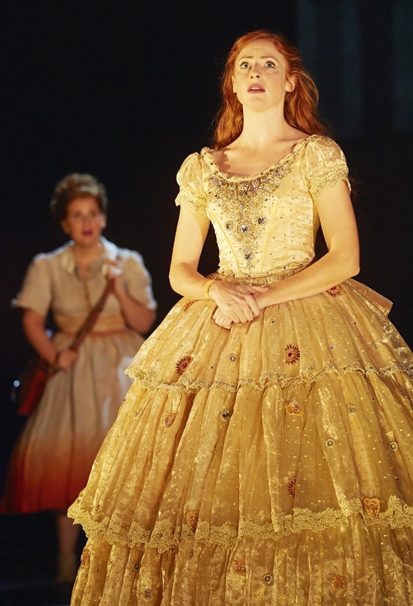There are many pleasures in The Light Princess, a new musical by Tori Amos. George MacDonald’s fairy story introduces us to a beautiful red-haired royal, Althea (Rosalie Craig), who has a mysterious resistance to gravity. After various tribulations she abandons life on dry land and becomes a mermaid. The show meets these technical challenges with some brilliance. Althea seems to float mysteriously across the stage in midair while being supported on the limbs of black-clad gymnasts. Later she moves to a lake, which is suggested by intricate layers of shimmering blue cloth. But despite the sumptuous and ingenious special effects, the show hasn’t a powerful enough storyline or sufficient character interest to become a hit. The engine-room is absent.
Compare it with three classic musicals: Oz, Twist and Superstar. In each of these the hero has a clearly defined mission. Dorothy must reach the Emerald City. Oliver must escape destitution. Jesus must embrace self-sacrifice. Once we know what the hero is after, we’re captivated by their journey and we stay captivated by it. But Althea has no purpose or motive. She wanders through a standard-issue fairy-tale world composed of lovely palaces, nasty goblins, an angry dad and a handsome prince. The baddies are a particular weakness here. Aside from her whimsical innocence, Althea has no engaging characteristics, and she doesn’t face an overwhelming ordeal that will lead to her transformation or redemption.
Early on she’s forced to marry a wicked consort, Mr Grey, who punctures her legs with calipers to make her stay grounded. But Mr Grey has no qualities. He’s just grey. Hair, clothes, ears, socks. Even his tongue is grey. And he says nothing at all. This makes him a very feeble opponent. As for the evil leg calipers, Althea just takes them off and opts for life as an amphibian. Her prince joins her in the water. They’re happy. Then they’re sad. Then she tells him to get lost. That’s about the limit of her psychological development. She goes from skittish butterfly to feminist dolphin.
There are deeper resonances here, of course. A wandering beauty crippled by her environment is meant to symbolise female oppression down the ages. And this important message is underlined in the programme notes, which include an essay on ‘Suffering Womanhood’ by Tanya Byron, who has a thesis-length title: ‘Consultant Clinical Psychologist: Child and Adolescent Mental Health and Professor in the Public Understanding of Science.’ She’s quite the maverick too. She audaciously dates one of Plato’s utterances to 4 BC. The Light Princess will be a success but only for a niche audience. Teenage girls, and their mums, will find the vapid Althea’s not-too-distressing woes absorbing. But it’s not a show for men unless they’re the type who adore the lovely intricacies of fine scenery and natty costumes. The lead song is catchy enough to become a hit but it would benefit from meatier orchestration, a thumping bassline and some distorted guitars. Covered by the Manics or Kasabian, it could become a festival-pleaser.
Off to the gulag at Southwark Playhouse to see Solzhenitsyn’s icicle-encrusted docudrama The Love Girl & the Innocent. Matthew Dunster’s spare staging puts the prisoners on a scattering of warehouse pallets. In one corner there’s a stroke of brilliance. A stack of old car tyres, with an orange lamp at its core, emits broken shards of ochre light that superbly suggest an iron foundry. The play is more diffuse and rambling than A Day in the Life of Ivan Denisovich, and without the compelling voice of a narrator it lacks focus and economy. And viewers have an absurdity to grapple with. Hardened by our experience of Schindler’s List and the work of Primo Levi we’re bound to feel that conditions in this Siberian nick are rather mild and accommodating. There are no executions. Booze is available. The guards are lazy and corrupt. Work parties sometimes flop around in bed all day. Wily prisoners who ingratiate themselves with their bosses can acquire power and responsibility. And women are openly traded for favours. It feels more like the BBC in the 1970s than a forced labour camp.
Plaudits were heaped on The Curse of Elizabeth Faulkner at Edinburgh this summer. Some hailed it as the next One Man, Two Guvnors. Along I toddled to a late-night showing at the Charing Cross Theatre where I sat through a predictable Gothic detective spoof. It’s nicely acted and thriftily staged as well. The action begins shortly after a burglary, which explains the absence of furniture (and saves the production a fortune). The comedy relies on a single effect, the collision between high Victorian seriousness and low modern flippancy. I’d have enjoyed it more if my expectations hadn’t been raised into the stratosphere in advance.






Comments